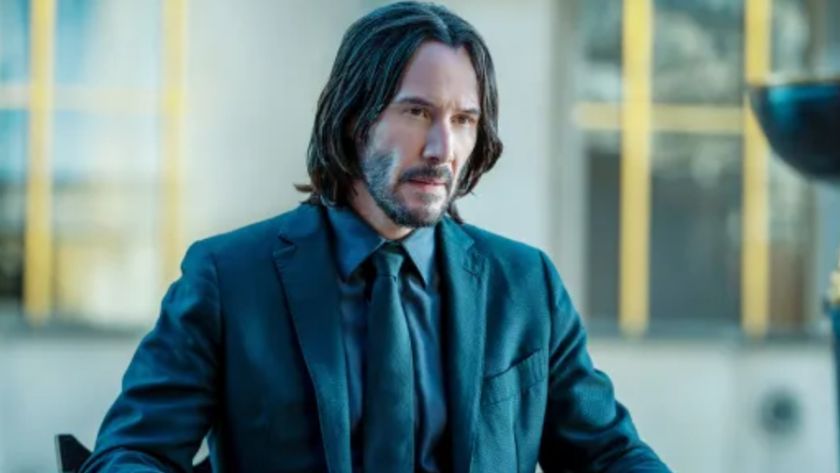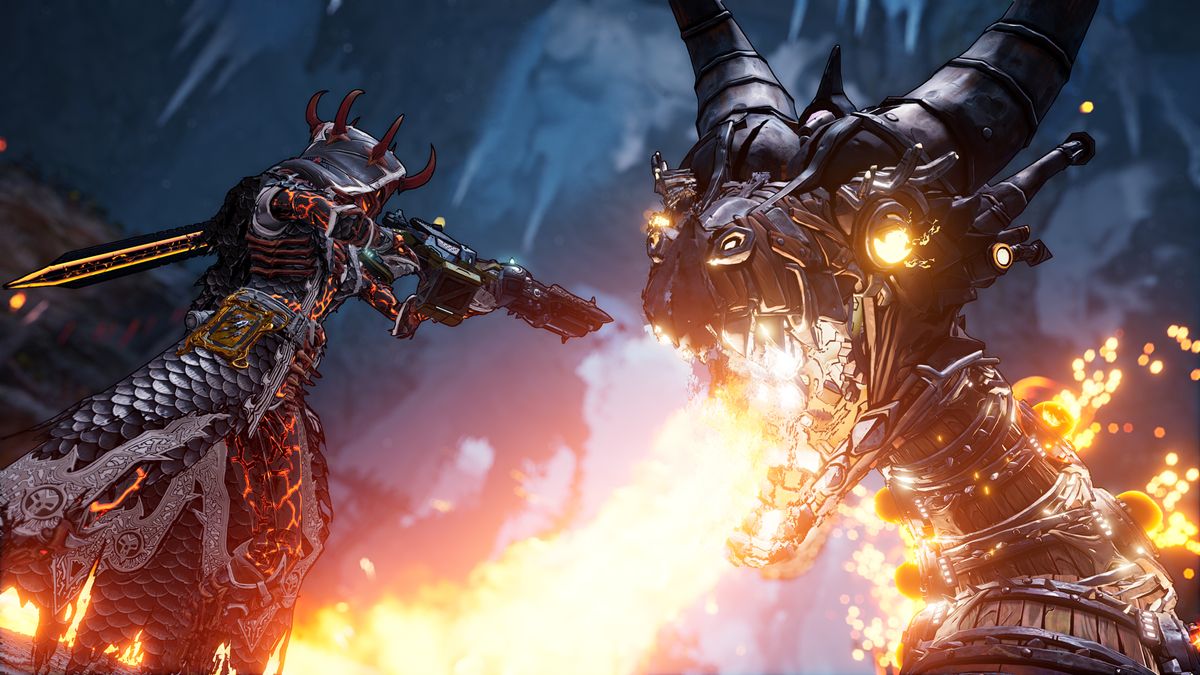
Before we get into Tiny Tina's Wonderlands, I'm going to be totally up front with you: my interest in the Borderlands series has been in precipitous decline since 2009. That isn't to say that I haven't celebrated developer Gearbox Software for all that it has achieved on Pandora, only that I was beginning to feel a little burned out by what that world was able to offer me. There's been this laser-like focus from Gearbox to make its looter-shooter bigger, bolder, and brasher with every installment – more carnage, more guns, and more god damned Claptrap; the scope of it had become as impressive as it was exhaustively familiar. By the time I called time on Borderlands 3, I found myself yearning for something more focused and distinct. For something different.
And Tiny Tina's Wonderlands is certainly different.
Roll of the dice
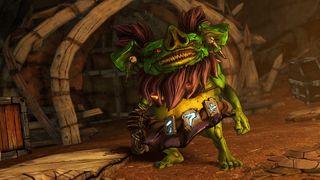
I've had a blast playing Tiny Tina's Wonderlands this past week. While my demo was relatively short, encompassing just two main missions and two side quests (a small window into a much wider adventure), I've felt this compulsion to return to it time and time again. I think that's because the game naturally generates curiosity, almost as if it were a resource you could accrue and later use to sway a particularly devious dungeon master.
My attention was ensnared in the interplay between the guns (too many to count, classic Borderlands) and my character's build, with weapon buffs feeding into equipped skills in a way that felt consequential. The demo only had two of the six available classes available, and while I'm keen to dig into the other four I could easily see myself sticking with the critical-hit focused 'Stabbomancer' assassin come March 25. Tiny Tina's Wonderlands is more distinct than Borderlands in this respect, allowing you to really dial into a preferred playstyle that extends beyond whether you want to shoot at short, medium, or long-range with a small contingent of ammunition types.
I mean, you don't have to shoot at all if you don't want to. The expansion of melee combat feels meaningful, with weighty weapons letting you smash and slash through waves of fast-moving, ever-encroaching enemies. There's a satisfying heft to the axes, blunt weapons, and single-handed swords, and an even more satisfying glide mechanic that triggers as soon as you swing – reeling you into the vicinity of an enemy before they are within natural striking range. For a series that has been so slavishly devoted to filling your field of view with a cacophonic mess of damage counters until the ammo counter hits zero, melee is a welcomed change of pace in Tiny Tina's Wonderlands.
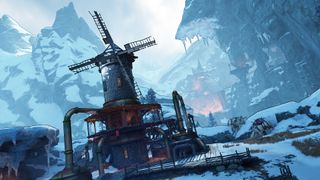
Not that you could ever run out of ammo in a game born of the Borderlands ethos; the idea that you could run out of a resource is antithetical to play, and there's even a death-reversing dice-roll device should you blast through your health reserves. Tiny Tina's Wonderlands also shows no restraint in preserving the sanctity of its whimsical fantasy environments, gleefully painting them with hit markers at every opportunity. Like the series it has spun out from, Tiny Tina's Wonderlands is visually busy and keen to fill any and all silence with sound. From my time exploring the Mount Craw enclosure, you can't walk more than a few meters without stumbling upon a chest filled with ammo, a small stash packed with cash, or some type of overbearing enemy that's filled to the brim with lootable weapons, equipment, and resources should you successfully drain them of their numbers.
Speaking of filling the soundscape, there's a whole lot of talking to be overheard. Be it from quest givers eager to their perspective on the forced oppression of Goblins, Tiny Tina herself who is keen to break the fourth wall to describe inconsistencies in her crafted Bunkers and Badasses session, or from the in-game role-playing characters themselves who will frequently comment on events as they arise. Not that I'm complaining about that last point, as Andy Samberg and Wanda Sykes are a true delight – the pair working well in their first video game voice acting gigs. Listen, Borderlands is a loud game, it always has and it always will be, and that hasn't changed for Tiny Tina's Wonderlands.
Sign up to the 12DOVE Newsletter
Weekly digests, tales from the communities you love, and more
One big change that I am keen to draw attention to is the replacement of grenades with a magic system. Again, this is one of those reasons I kept coming back for more, because it's such a dynamic shift that has the potential to change the fundamentals of combat. Magic runs on a cooldown, whether you're raining fire on the head of the mechanical serpent Vorcanar or firing off frost spells towards enemies who aren't imposing enough to be granted their own unique in-universe name. Speaking as somebody who spent an inordinate amount of time running a Mage in World of Warcraft, it was particularly cool to see spells bearing a striking resemblance to Meteor and Magic Missiles rendered in such spectacular fashion.
Adventure awaits
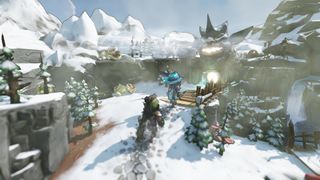
The Borderlands games have given me a lot of enjoyment over the years, and sometimes it's important to recognize when you've had enough of a good thing. I thought I was done with the series in 2019 and I certainly didn't expect to be ensnared by a spin-off a little over three years later. But from my brief time with the game, it feels as if Tiny Tina's Wonderlands has retained the chaotic spirit of Borderlands and channeled it into a leaner, denser, and more focused format.
There's still so much of it I'm yet to see as well. There's the traditional RPG-inspired overworld, all long grass and random encounters. There's the full extent of the character creator and skill trees, which threaten to give us the freedom to really build out these adventurers as true extensions of our playstyle preferences. And of course, the return of co-op, which supports up to four Fatemakers – I just hope my friends are as similarly enthralled by this energetic session of Bunkers and Badasses as I am.
We spoke with Gearbox to learn how the team is working Tiny Tina's Wonderlands into a smart distillation of the core Borderlands experience.

Josh West is the Editor-in-Chief of 12DOVE. He has over 15 years experience in online and print journalism, and holds a BA (Hons) in Journalism and Feature Writing. Prior to starting his current position, Josh has served as GR+'s Features Editor and Deputy Editor of games™ magazine, and has freelanced for numerous publications including 3D Artist, Edge magazine, iCreate, Metal Hammer, Play, Retro Gamer, and SFX. Additionally, he has appeared on the BBC and ITV to provide expert comment, written for Scholastic books, edited a book for Hachette, and worked as the Assistant Producer of the Future Games Show. In his spare time, Josh likes to play bass guitar and video games. Years ago, he was in a few movies and TV shows that you've definitely seen but will never be able to spot him in.
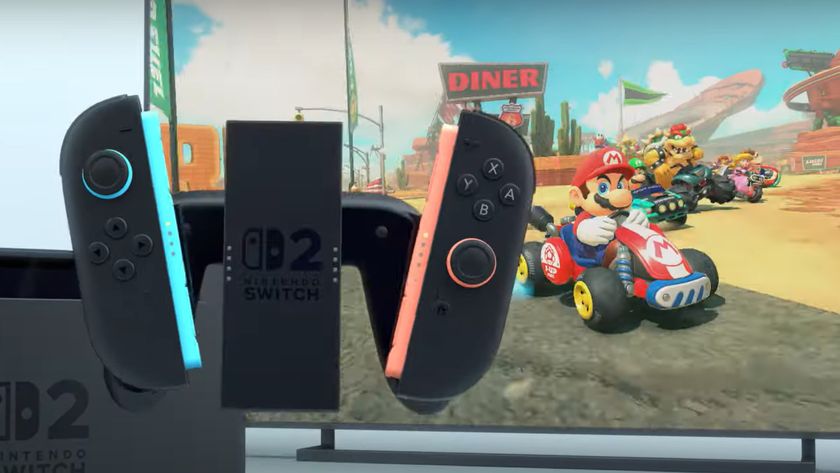
Ex Nintendo PR managers say the Switch 2 generation is likely to see the retirement of "several of the major developers at Nintendo who we have known for 40 something years"
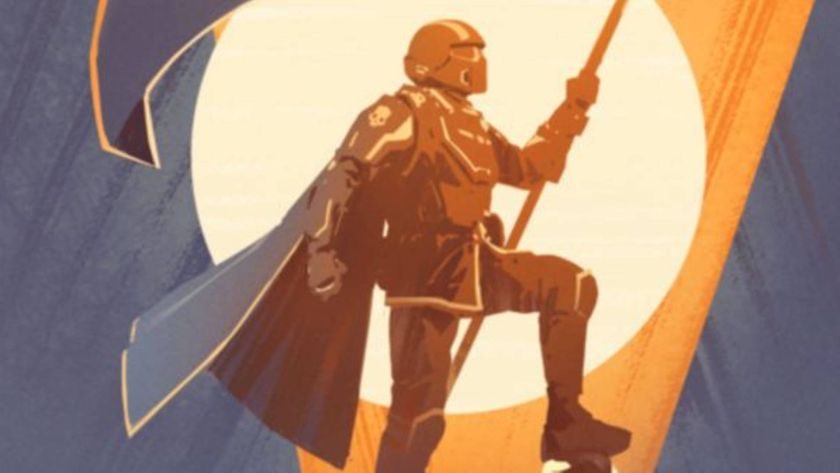
Helldivers 2 CEO says industry layoffs have seen "very little accountability" from executives who "let go of one third of the company because you made stupid decisions"
